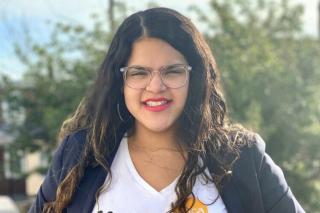“For me, Simmons was about empowerment,” says Erika Rodriguez ’14, who double-majored in political science and Africana studies. “We were learning to advocate for ourselves holistically: for our mental health, as well as personally and professionally.”
Rodriguez continues to focus on empowerment in her role as Executive Director of Chica Project, a non-profit organization offering mentorship opportunities for Latinas and other women of color. “I gained a lot from the culture at Simmons. A big part of an all-women’s school culture is dismantling internalized sexism. At Simmons, my peers and I found so much pride in being women or being a gender non-conforming person and claiming that as access to our education. That was a nuanced and powerful part of the Simmons culture that evoked so much high self-esteem for me, so much confidence.”
She first discovered Chica Project as an undergraduate, searching for an internship to fulfill a political science course requirement. “I loved the mission,” she recalls. “It’s all about closing the opportunity divide for Latinas and people of color, both professionally and personally. That spoke volumes to me.”
Undergraduate studies are a time to explore, to have hard conversations, and to open your mind.
Born and raised in Boston by parents from the Dominican Republic, she benefited from positive youth development from the age of 12. “I’m super passionate about giving back to my community, helping to stop youth violence, and creating change at a systemic level.”
Part of Rodriguez’s goal at Chica Project is to create a leadership pipeline for young people. “Our mentors are multicultural and intergenerational. Some mentors are college students, like I was, and we also have well-seasoned professionals from multiple sectors — photographers, lawyers, and teachers. We offer mentorship to youth from ages 12 to 18. Once they age out, they can become mentors and interns themselves.”
That leadership pipeline is vital to their sense of self. “We teach our youth that it’s not a deficit mindset — they are going to be the next leaders in our economy. That is the reality.” While the challenges of running a sustainable nonprofit remain, Rodriguez is hopeful. “We still have a lot of work to do, but we’ve come a long way toward understanding that philanthropic work and nonprofit work have a shared goal of leveling the playing field, and that should be done in community.”
Thinking back to her time at Simmons, Rodriguez calls out Emerita Professor Theresa Perry and Professor Janie Ward as strong guides. “I have so much appreciation for them because they allowed me to navigate and explore where and how I wanted to make change as a leader and as a person of color.” She considered becoming a teacher, and critical reflection on how to teach students of color informs the work she does now. Rodriguez encourages current students to ask a lot of questions, participate, and bring their whole selves.
“My classes at Simmons were filled with different perspectives and experiences,” remembers Rodriguez. “It can be intimidating to bring up your experiences — with the METCO program, for example, or something else controversial — but my professors wanted to hear different perspectives. They provided the opportunity to discuss challenging topics in a safe way. Undergraduate studies are a time to explore, to have hard conversations, and to open your mind.”

